China’s city dwellers are all too familiar with street corner real estate agent – be-suited salespeople desperately pitching properties to unreceptive passersby. The situation is wholly undesirable – an irritated public and downtrodden staff wasting thousands of hours toiling on windy street corners. Angejia is a new O2O internet real estate trading platform that aims to change the way the industry operates – taking the property market online, thus making redundant the role of the lowly street agent.
Creative agency Lowe was brought in to sell Angejia’s message of hope to the disillusioned agents and start setting the wheels of change in motion. The initial plan was simple – appeal directly to the individual agents with a personal message from Angejia CEO Mike Liang: ‘Join us and leave this miserable existence behind’. The message was to be delivered via labels on thousands of water bottles handed directly to estate agents on the street.
The reality however, is that water bottles are as negligible as the agents to whom they were intended to appeal. The result was thousands of used bottles, unread labels and the majority of the budget on the scrap heap. The agency needed a plan to salvage the campaign. The idea to shoot a three-minute microfilm on a shoestring budget, with a first time director, aimed at garnering sympathy for the much-maligned estate agents whilst portraying the Angejia Chairman as a noble philanthropist was, frankly, a bold decision. The results are unusual, emotive and impressive.
SHP+ joined Lowe Senior Creative Director and first-time film director Leo Liao to talk about the rollercoaster campaign.
You present the CEO of Angejia as a kind of hero, with noble aims to help the estate agents. It’s an unusual angle. Was it the objective of the client to portray the CEO in this way? What was the brief from Angejia?
When I first received the brief, I talked with (Angejia CEO) Mr. Mike Liang, and I found that though he was a capitalist, he was also a man of sentiment. He wanted to use business to do good. On top of that, all of the other ads for estate agencies are very simple and crude. I felt that we needed a new direction that would suit Mr. Liang’s temperament.
If you walked into an Angejia office and saw the working environment, you would know that Mr. Liang cares very much about style and design. He’s sophisticated. He drinks coffee. He earns money in a decent way. You can’t give someone like that a trumpet and let him peddle on the street – you have to give him a stage, a microphone, or a pen, and writing paper.
We also thought that helping the weak deserves as much praise as challenging a bully, so we wanted to present Mr. Liang as a hero of the weak. Mr. Liang’s requirements were very simple. He wanted his company to exert influence and let the competition know that Angejia are there to change the industry.
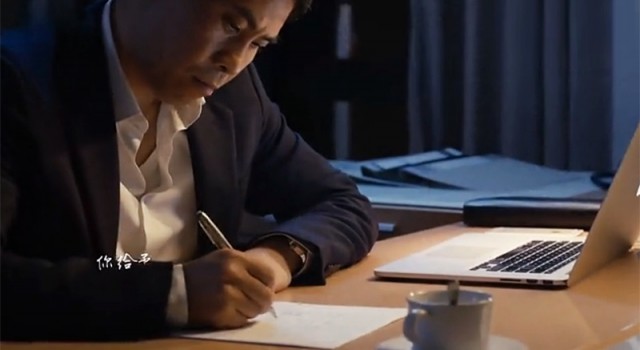 Mike Liang, CEO Angejia
Mike Liang, CEO Angejia
Did the eventual concept come to you early on, or were there other approaches you were working with initially?
The biggest difference between Angejia and conventional real estate agents is that Angejia is an O2O internet-based real estate trading platform, which will undoubtedly eventually come to replace the conventional model. But Angejia is in no hurry to publicise their brand. Instead, they want to create a conversation within the industry. Our plan was to carry out a revolution by hiring conventional estate agents. We prepared a letter in the name of Mr. Liang and stuck it to bottles of ice-cold water. On the hottest summer day in Shanghai, we called on the Angejia staff to deliver water to conventional agents. I called it the “Velvet Revolution” because it’s non-violent. It’s soft, considerate, and sincere. We truly wanted them to join Angejia.
But, unfortunately, it was ineffective. Most of the agents didn’t notice the letter and just threw away the bottles after they drank the water. After that I suggested that we turn the letter into a microfilm to give the message a broader reach.
Were there any other films that inspired the tone of this film?
I’m obsessed with film, especially those that tell a good story. To me, they are like dreams. What influences me most though, is life itself. I wrote the story for the film myself and I finished it really quickly. I’m very familiar with the kind of life I was writing about. I see estate agents everywhere. I’ve moved 17 times since I started working. It was real life that inspired me.
There was an element of risk in going with this concept, since estate agents are not well liked in society. What has been the feedback? Have people expressed sympathy for the protagonist?
The protagonist was a typical, low-social-status person. We needed to touch the audience through his story. There are many annoying estate agents – but that’s a problem with the conventional model, not with those people. Angejia is the right innovative force to change the old model.
The reaction has been beyond our expectations. Many people were touched by the moment when the protagonist is recalling his bad day on the way home in the dark and we hear the phrase: “You deal with the most expensive thing in this city, but you can’t get the smallest dignity.”
I made sure the train was noisy because I felt that echoed the protagonist’s inner turmoil. The tragedy of the lowly estate agent was just the tip of the iceberg of this moment in time. Everybody has more or less the same feeling of helplessness in life.
Though the leading man is not a professional actor, he performed really well. I chose him because he naturally suits the character. He told me that he had worked a lot of low-level jobs before. When he first came to Shanghai he lived in the same kind of rented apartment as the place we used as the location. He had a lot in common with the protagonist. Actually, many of the actors in this film are amateurs, but they all performed very well. I believe there are no bad actors, only unsuitable character roles for that performer.
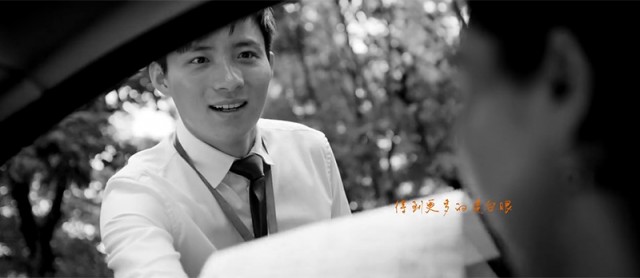
Tell us a bit about the shoot.
Everything depended on the budget, and the budget for this film was very small. Most of the money was already spent on the water delivery campaign. This was part of the reason why I directed it myself. I have been thinking about directing for many years. So, I organized a simple team – most of the crew was my friends, and I was involved in everything including the location scout, art direction, stage direction and casting.
What were the biggest challenges in making the film?
The biggest challenge was definitely the budget. Many people in advertising want to be directors. I believe that in the future a lot of good directors will come from the advertising industry because they write stories and scripts every day. I think the only way that a director can claim ownership of a work is if he either wrote the story, or he brought the piece to another level. Otherwise, the director is just the executor. The idea alone is not enough – money and opportunity are also necessary. I want to thank Kitty, Mr. Liang and all of my friends who helped me to realise this opportunity.
Full 3-minute spot
Director’s Cut
居住在城市的大部分中国人对站街的房产中介都无比熟悉,他们通常西装革履,不厌其烦地向过路人推销房产。这种方式其实是很不受欢迎的,因为它很容易 惹恼公众,而不受待见的中介们还要浪费数千小时站街工作。安个家是一个全新的O2O互联网房屋买卖平台,它希望能改变这个行业的旧模式,把房产市场扩展到 线上,从而使得地位低下的站街中介得到解放。
安个家找到了睿狮广告传播为其传达这个愿景,行业改革的车轮也因此转动。最初的计划其实很简 单,就是将安个家CEO梁伟平的一封信带给中介:“加入我们, 告别最糟糕的工作。” 他们把这封信做成标签粘贴在了一个个矿泉水瓶上,由安个家的员工把这些矿泉水送到站街中介的手上。
然后现实是,这些水瓶就如同站街中介一样 轻而易举地被忽视了。大部分预算就这么浪费在了一个个矿泉水瓶和标签上。因此,安个家十分需要一个新的创意 来挽救这个活动。于是睿狮决定拍摄一部三分钟的微电影,尽管此时预算已经很少。该片的创意总监首次担任导演,他把安个家的CEO塑造成了一个类似慈善家的 形象,并且要为以往备受争议的房产中介争取到大众的同情,这其实是一个很大胆的想法。
SHP+邀请到了睿狮资深创意总监,也是首次担任导演的廖义源,和我们一起分享了这个项目的种种迂回曲折。
您将CEO梁伟平先生塑造成一个类似英雄的形象,有着高尚的目标,去帮助底层的房产中介,这是一个与众不同的角度。这样刻画CEO的形象是客户的要求吗?安个家方面的基本要求是什么呢?
接 这个活的时候,我跟梁伟平先生聊了一会儿。我觉得这个老板很有情怀。当然,他也是“资本家”,但是我们并不排斥有情怀的资本家对不对?这是其一。其二,现 在满大街的中介广告都在喊:0佣金,真房源!简单粗暴。我觉得我们需要一个新的说话方式,而这个方式要符合梁先生的气质。如果看过安个家的办公环境和他们 的门店,你就知道梁先生是个有品位有格调的老板。他是喝咖啡的,他是需要站着挣钱的,需要高级一点的方式,拾起尊严和脸面,不要低三下四。所以,你给梁伟 平一个大喇叭让他去喊大街,那肯定是不对的。我们要给他一个舞台,一个话筒,或者是一支笔,一张信纸。说到英雄,我觉得同情弱者或叫板恶霸一样都值得称 赞,这次我们让梁先生同情弱者。
梁先生给到我们的要求就是:公司刚刚成立,但是要在行业内发出声音,让业内知道我们是来改变这个行业的。至于怎么发声,你们看着办吧。就这么简单。
您是早就决定用这样一个概念还是起初有过别的想法?
是 这样子的,首先安个家区别于传统找房中介最大特质就是,他们是全新的O2O式互联网房屋买卖平台,这个模式势必取代传统式的站街叫卖。而他们并不着急对外 宣传,他们想对行业内说话,而通过行业内的对话其实多少也会受到外界的关注。所以我们给他们想的是一场革命,这个革命通过招聘传统中介的形式落地,于是就 有了“告别最糟糕的工作!”这个想法。
起初,我们的idea是给传统的站街中介发“传单”,我们以梁伟平的口吻写了一封信,把这封信贴在一 瓶瓶矿泉水上,在上海最热的一天,号召安个家全体员工上街去给传统中介送水。我把这个叫做“天鹅绒革命”,不是暴力革命,是温柔的体贴的,甚至走心的,让 他们告别没有尊严的工作,加入安个家。
活动做完了,但是影响力并不大,我觉得问题是信上的内容没有被放大,很多中介不看水瓶上的信,喝完直接扔垃圾桶了。后来我主动找到梁伟平说,我们需要把这封信拍成一个微电影,这样才能承上启下。
Water Bottle Campaign
这部宣传片的基调是否有受到其他宣传片或者电影的启发?
我 很迷恋电影,特别是故事讲的好的电影,我觉得那个就是梦。所以自然会被一些电影给影响,但手法上的影响还好,重点是生活本身的影响。故事是我自己写的,而 且很快就写好了,因为你每天生活在这样的环境里,你开车,走路,逛街,都能看到这样的中介。我后来跟团队们聊天的时候,我才发现从我出来工作到现在,一共 搬过17次家,你说我跟多少中介打过交道,我在朋友圈里说过一段话,我说那是我对生活和生命的感悟,是我通过自己的遭遇看待这个世界的方式,这不是吹牛, 是真实的生活让你触动。所以,不需要受其他人影响,就是生活本身这个基调影响了你。
房产中介在当今社会不是一个很受欢迎的群体,启用这样一个概念想必有一定风险。目前这个宣传片的反响如何呢?观众对片中的男主角是否表现出同情?
男 主角是一个典型的社会最底层小人物,我们需要通过这个小人物的故事来打动大家。当然也有朋友说,我就遇到过特别讨厌的中介,没错,但是我想说的是,这不是 个人的错,而是这个旧制度,旧模式的错误。个人只是被体制,被教条裹挟着往前走的。因为从来都是生产模式改变生产力。安个家就是改变这个旧生产模式的一股 革新力量,它会改变传统中介在人们心目中的形象。
反响超出我们预期,其实不止是中介圈,在普通人中也是。
当男主角骑着自行车 往家走的时候,轰隆隆迎面擦身呼啸而过的城铁,我故意把列车的轰鸣声调得非常大,我觉得这个声音就是他内心的一种不平静吧。当列车窗户的光影如胶片一样一 格一格拍打在他脸上,然后他回忆起一天的遭遇,这个时候有一句话是这么写的:“你每天跟这个城市最昂贵的东西打交道,却换不来最起码的尊严!”很多人被感 动是这个瞬间,其实我想表达的是这个小人物的悲剧只是大时代下的冰山一角。我们都有无法逃避的世俗,都有还不完的房贷,都有一夜暴富的美梦,都有最大的欲 望和最强烈的无可奈何,而那些沿街的传统中介只是一面镜子。
男主角演得非常好,因为这个角色适合他,他并不是一直是个专业演员。他跟我说过 他做演员之前,摆过地摊,送过外卖,酒吧,西餐厅,卖过大闸蟹。都是一些社会最底层的工作,所以深有体会吧。他拍第一场戏在我们找的那个出租房的时候,他 就说,他刚来上海住的就是这种地方,这也是我找他的原因。别说男主角,片里多数是非专业演员,骂人的阿姨,夜宵同事,看房屋信息的夫妻,他们都演得非常 好。因为我们没有预算,所以都是周边的朋友和同事,其实没有烂演员,只有不适合的角色。
能谈一谈微电影的拍摄情况吗?比如花了多长时间,地点的选择等等。
一切问题都是预算问题。客户已经把钱花在送水的活动上了,拍这个微电影的预算少得可怜。我就说自己来吧,反正自己想做导演光说不练很多年了,于是就撺了一帮人开干了。找了一些制作圈的朋友,搭了个简单的队伍,从堪景美术道具演员,都亲力亲为呗!
制作这部宣传片遇到的最大挑战是什么?
最大的挑战就是前面提到的预算问题吧。我觉得不必诉苦,你要做这个事情,就必须承担这个苦,就必须承担好的坏的毁誉参半的种种结果 。
我 觉得反而要感谢Kitty,还有梁伟平先生,还有我那些制作圈的朋友,他们给了我这个机会。还是那句话,其实广告圈想做导演的人特别多,因为他们都是有故 事的人,平时每天都在写脚本写故事,都想通过自己的感悟给大伙儿讲故事,这是好事,未来导演界的人才可能就出在广告圈。其实我一直都有一个疑问,就是到底 什么叫做导演作品,在我心目当中导演与作品最大的关系就是跟这个故事之间的关系,得是你自己写的或者经过你提升到另一个层面的,不然你就是一个执行者,因 为那个故事跟你之间没有直接的关系。我看到很多导演拿着出街的作品说是自己的作品,我觉得那个作品基本的营养还是在写这个故事的广告人中。所以,我觉得广 告人想做导演都是顺理成章的。但是光有想法是不够的,得有办法。办法就是机会,就是钱,就是有人帮助你,我感谢所有帮助过我的人!




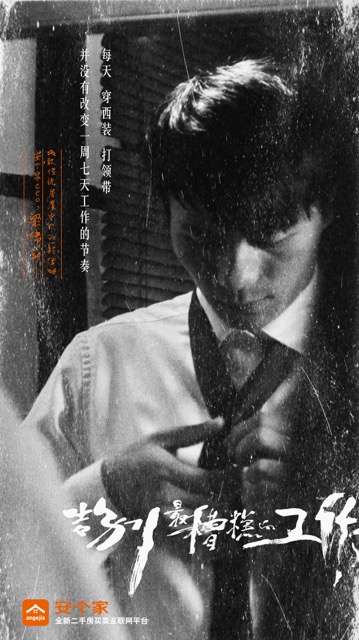
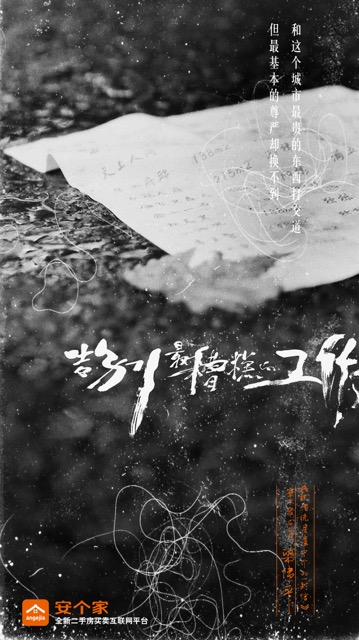
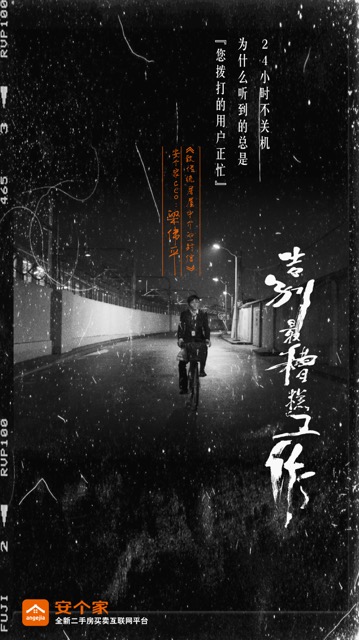
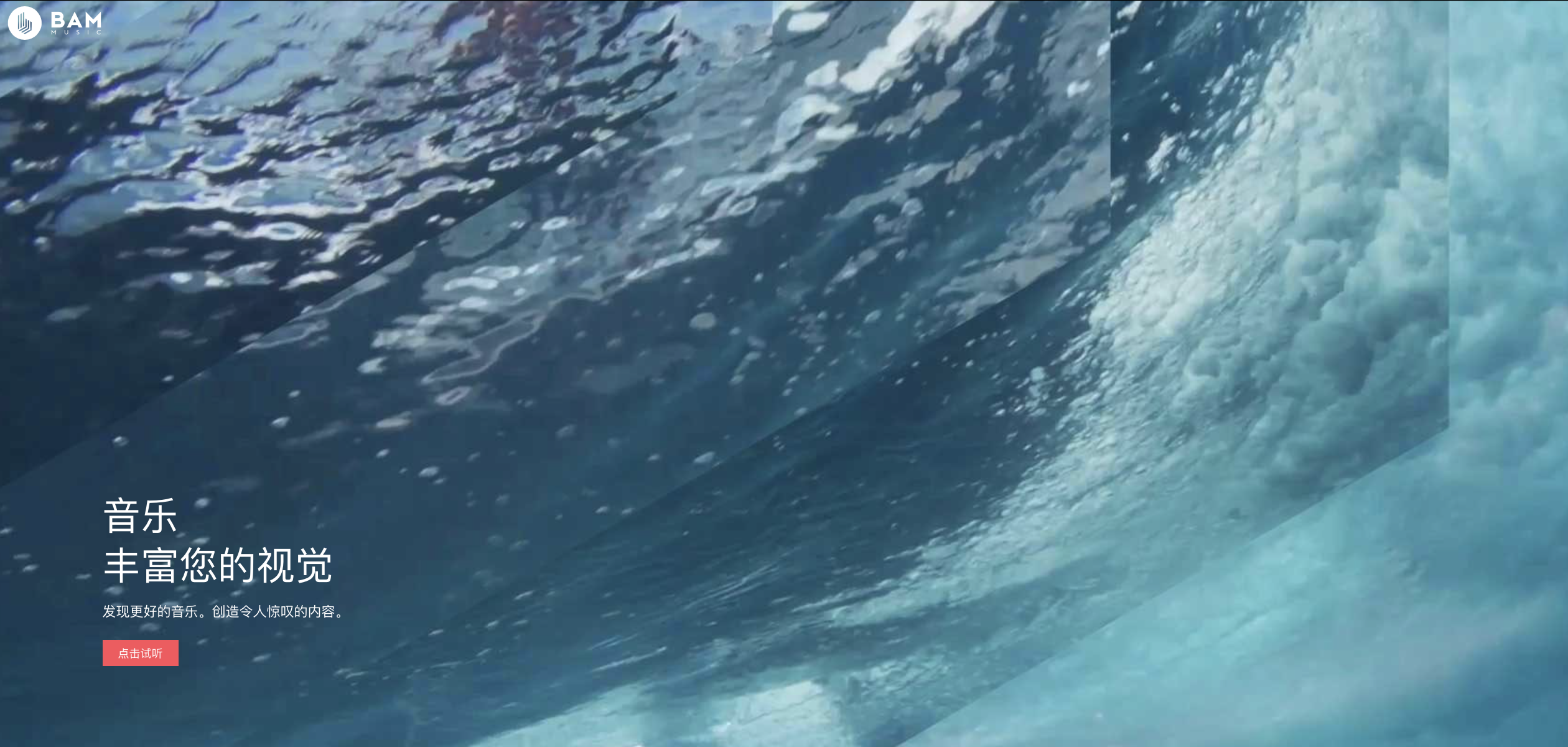 BAM Music Library Brings Edgy, Indie Sounds to Chinese Creatives
BAM Music Library Brings Edgy, Indie Sounds to Chinese Creatives
